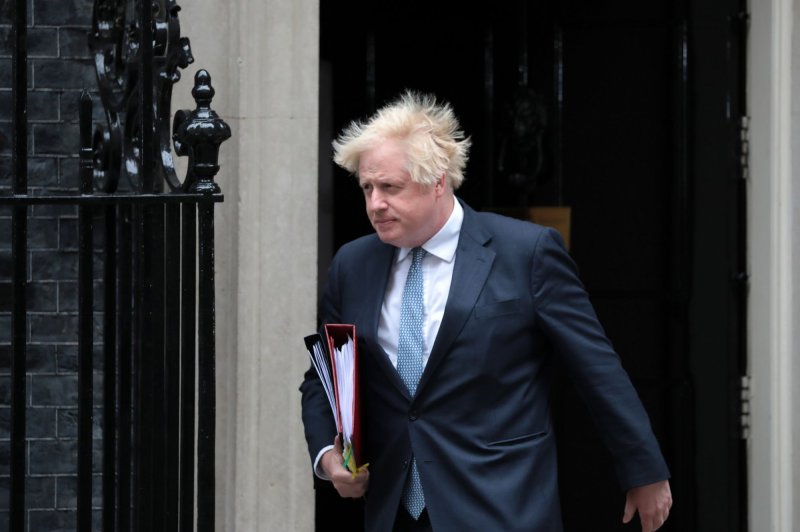British Prime Minister Boris Johnson said Wednesday he won't resign amid growing calls for him to do so. File Photo by Hugo Philpott/UPI |
License Photo
July 6 (UPI) -- British Prime Minister Boris Johnson on Wednesday rejected calls for his resignation despite growing pressure within his own Cabinet and an avalanche of one-time allies resigning from the government.
Johnson vowed to "keep going" during a heated session of the House of Commons on Wednesday. His defiance came after Conservative MP Bernard Jenkin suggested he call for a general election.
"On the contrary, what we need is a stable government, loving each other as Conservatives, getting on with our priorities," Johnson said.
Wednesday evening, a delegation of Cabinet members visited Johnson at No. 10 Downing Street to urge him to resign.
Politico reported Johnson fired Leveling Up Secretary Michael Gove after he told the premier to quit.
"You can't have a snake who is not with you on any of the big arguments who then gleefully tells the press the leader has to go," a source told the BBC of the sacking.
Meanwhile, dozens of other government officials have resigned in the past 24 hours amid growing criticism of Johnson's handling of a scandal involving former Deputy Chief Whip Chris Pincher, who was accused of groping two guests at a dinner last week.
Will Stout, minister for children and families, announced his resignation on Twitter.
"With great sadness and regret, I have this morning tendered my resignation to the prime minister after I accepted and repeated assurances on Monday to the media which have now been found to be inaccurate," he said.
Robin Walker, minister of state for school standards, also resigned Wednesday.
"Unfortunately, recent events have made it clear to me that our great party, for which I have campaigned all of my adult life, has become distracted from its core missions by a relentless focus on questions over leadership," he tweeted.
Their departures come one day after two other top Cabinet members, Sajid Javid, secretary of state for health and social care, and Rishi Sunak, chancellor of the exchequer, resigned their posts.
Johnson has faced criticism for appointing Pincher to a top-level position in February despite the fact that the latter had previously faced sexual misconduct allegations.
Johnson's ministers initially said he hadn't known about the allegations, but on Monday, a spokesman said the prime minister knew about the allegations but believed they were "either resolved or did not progress to a formal complaint."
On Tuesday, Simon McDonald, the former top civil servant at the Foreign Office, sent a letter to Kathryn Stone, parliamentary commissioner for standards, saying Johnson was briefed about Pincher's behavior before his February appointment.
"The original No. 10 line is not true and the modification is still not accurate," McDonald wrote of Johnson's various statements.
"Mr. Johnson was briefed in person about the initiation and outcome of the investigation. There was a 'formal complaint.' Allegations were 'resolved' only in the sense that the investigation was completed; Mr. Pincher was not exonerated. To characterize the allegations as 'unsubstantiated' is therefore wrong," he wrote.















